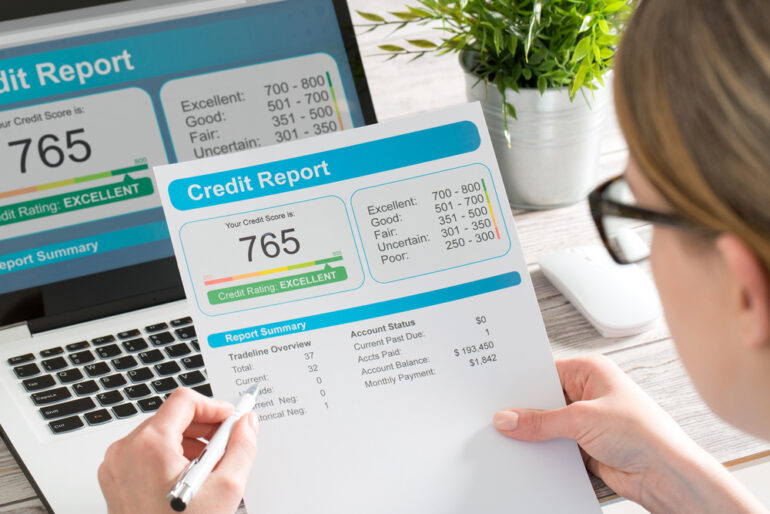You may have earned a bad credit score due to mindless financial habits. Or maybe life demanded more in cash outlays than your income allowed, and now your score is in the cellar. No matter how you arrived at your bad credit score situation if you’re motivated to fix it, you can.
However, you’ll need to come clean with yourself and commit to a plan if you want to see meaningful change. Once you’ve created a plan, be sure to follow through on it, even when it gets uncomfortable. After you’ve made good on your promise to your financial future, you’ll open yourself up to a world of financial opportunity.
1. Get Real With How Bad It Truly Is

You’ve seen the credit score alerts in your inbox. And the number may be printed in bold at the top of your credit card statement. But have you dug into what your numerical score means?
The experts at consumer credit reporting agency Experian say anything lower than 670 is bad news. Most consumers should aim for a score that earns a rating of good, very good, or exceptional.
Assuming your score is below 670, dig into what makes up your current status. Do you have a poor payment history, or is the issue that you max out your cards every month? Identify your problem areas and take note of the reported information that’s weighing you down. When you’re ready to create your plan, this info can help guide your efforts.
Shrug off any shame you may be carrying about your score. Today you’re in the position of doing something about it, and regretting past choices won’t get you to your goal.
2. Create a Goal-Related Timeline
Do you hope to buy a home in the next few years? Or is your clunker of a car on its last leg, threatening to die at any moment? Review your score-related goals and craft a credit-building timeline that works for your situation.
While personal desires or life factors may drive your efforts today, the need for a solid score surpasses loan activity. Credit bureaus regularly update your score, based on the data passed on by your creditors. This reality of the system means that your score is ever-changing.
So get creative and consider new ways of improving your score that doesn’t require a credit check. According to Chime, one way to boost your score is by prudent use of a credit builder card. These cards report your payment history and are accessible to most consumers. If you use one wisely, you’ll boast a revolving credit line and good payment history, which together make up 45% of your score.
3. Fix Your Budget Blind Spots for Good

Swiping without thinking is an easy habit to get into and one of the hardest ones to break. Researchers have found that buying with a credit card incites less pain than doing so with cash. But with cashless payment methods increasingly being the only options available, it’s up to you to control your spending. If you’ve run up your credit balances, sticking with a debit or secured cards could help you stay on track.
Life is expensive, no doubt, but you have to steward your resources well. If it’s time to cut back or approach your finances in a new way, be open to new ideas.
Consider a job change or get a roommate to share the load of monthly bills. Cut back on online shopping or challenge yourself to cook restaurant-worthy meals at home. Each change you make can get you closer to a more balanced budget and higher credit score.
4. Focus Your Attack on Your Score’s Biggest Factors
You probably focus on the “biggest bang for your buck” strategies in most situations, and your credit score is no different. Here your payment history and amounts owed are the biggest drivers of your score.
Paying your bills on time is a basic component of responsible adulthood. If you’ve gotten off track from even paying the minimum, now’s the time to halt that habit. On-time payments account for 35% of your score, so fixing this area of your financial life is non-negotiable.
Addressing your amounts owed — or credit utilization — can take more time, but it’s worth it, as it makes up 30% of your score. If your revolving credit lines are using more than 30% of your total available credit, it will drive down your score. Keep the 30% rule in mind when an opportunity to swipe arises, and make your decision wisely.
If your balances exceed 30% across all of your cards, create a plan to pay them down over time. Aim to reduce your carried balances each month, and you’ll see your total utilization drop. Another thing you can do is utilize a credit booster to get better credit.
5. Watch Your Credit Report Like Your Future Depends on It

When was the last time you checked your credit report, not just the tabulated score? If you haven’t combed through the years of reported data, today’s the day to change that. You’re typically able to access your entire credit report, free of charge, each year. Request yours, save the exported data and get to work.
You may find that you’ve forgotten a store card that you opened back in high school. After years of not paying your balance, it’s been charged off and tarnished your record. You could also find reports of missed payments for a card you pay off religiously. If there are inaccuracies, it’s on you to dispute them. Report any errors to both the card issuer and the credit reporting bureaus, complete with a dispute form and documentation.
Recreate Your Financial Persona One Action at a Time
Your internal dialogue may have you believe that you’re bad with money. Even if your credit score could say the same thing, remember the power you hold within you. Humans reinvent themselves all the time, and you’re no different in the best of ways. Harness the power of your mind when it comes to pursuing a better financial future.
Adopt a mantra that supports your credit-building efforts. Stating “I am good with money” or “I am making progress on my debt” aloud can turn thoughts into action. Shift your thinking toward becoming a high-credit individual and make decisions like “future you” would. Sooner than you think, your measured actions will become habits, and you’ll be boasting an exceptional credit score.
